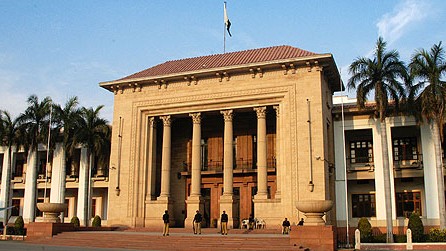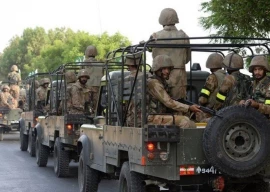
The Khyber-Pakhtunkhwa (K-P) Assembly has paid a hefty price to sustain democracy: it lost the largest number of lawmakers as compared to any other provincial assembly. Of the 12 lawmakers who died during the tenure of the assembly, at least three were killed in terror attacks.
Bashir Ahmed Bilour, Alamzeb Khan and Dr Shamsheer Ali Khan were killed in terrorist attacks, while Akhtar Nawaz Khan was killed on account of a family feud.
The tenure began with a thunderous session in which a resolution was passed calling for a United Nations-led investigation into the murder of former prime minister Benazir Bhutto.
Following this session, despite a wave of terror attacks and unrest in the province, the house was able to meet 439 times, and passed up to 102 bills during its five-year tenure from 2008-2013. It met for 71 days during the first parliamentary year, 72 in second, and 108 in third, 101 in fourth and for 87 days in the last year.
During these meetings, the assembly passed 101 bills, including 87 government and 14 private member bills, and 10 ordinances. Furthermore, 320 resolutions were passed separately.
The legislature manifested a commitment to the welfare of women. In keeping with this agenda, the Commission for the Status of Women Bill was passed in 2009, followed by the Enforcement of Women’s Ownership Rights in 2012.
The Child Protection and Welfare Bill, passed in 2010, and the Preventive Health Bill passed in 2012, goes a long way to indicate the assembly’s tilt towards welfare legislation.
The house proceedings heard 1,059 questions answered. Jamiat Ulema-e-Islam-Fazl lawmaker Mufti Kifayatullah asked the most number of questions, about 658, while Pakistan Peoples Party lawmaker Noor Sehar followed with around 536 questions.
On the other hand, the assembly’s standing committees met about 662 times in the past five years.
Punjab
The Punjab Assembly witnessed a regime of fiery discourses, petty squabbling and some very important bills. Its constitutional term is scheduled to end on April 8.
Of the 154 bills introduced, 133 were passed by the assembly in a total of 45 sessions. The famed Punjab Local Government Amendment Bill sailed through the assembly several times, got tweaked by five amendments, finally stalling local body elections. Secondly, the Punjab Katchi Abadis Amendment Act 2012 provided land ownership rights to several hundred peopls across the province. Thirdly, the assembly also passed several bills pertaining to the formation of women’s universities. Some amendments over house rules were also made. The assembly met for a total of 302 days.
The resolutions about the formation of a South Punjab province and the restoration of the Bahawalpur province, were passed unanimously during the final months of the assembly’s tenure.
Following the passage of the 18th Amendment Bill in 2010, which asked for the devolution of 18 government departments to the provincial level, the Punjab Assembly administered to comprehensive lawmaking, ensuring provincial regulation of these portfolios, instead of resorting to mere notification. The 133 bills passed by the assembly were termed by Punjab Law and Parliamentary Affairs Minister Rana Sanaullah as no mean feat, as the previous assembly passed fewer bills.
Sessions in the tenure were marked with characteristic acerbity between the ‘loyal’ and ‘turncoat’ lawmakers. Bitterness pervaded ties between women legislators of the Pakistan Muslim League–Quaid, and between leaders like Sheikh Allauddin and Mian Atta Muhammad Maneka. The former group of legislators was also known to give the toughest time to the treasury benches during assembly sessions. Furthermore, peals of laughter followed the regular face-offs between leader of the opposition Raja Riaz and Punjab Law and Parliamentary Affairs Minister Rana Sanaullah over the rules of the English language.
From the 154 bills introduced in the assembly, 11 are pending in standing committees, 10 are withdrawn, while a total of 133 bills were passed. Furthermore, in five years, a total of 12,798 notices were received, 10,965 are admitted, while 1,713 are disallowed.
A few days earlier, the Punjab cabinet gave its approval for the Right to Information Bill, but, unfortunately, it was not introduced in the assembly for its passage.
Balochistan
During the five-year tenure of the government of Balochistan, the province saw more than its share of devastation. In 40 sessions of the provincial assembly, only 48 bills were passed, while the representatives demonstrated a complete disregard for the people and blatantly pursued their self-interests above all else.
During the last two years, the province received more than Rs360 billion as direct transfers and shares from a divisible pool of resources. Furthermore, the lucrative National Finance Commission Award granted Balochistan additional revenue, raising its share from 5.1% to 9.1% of the national pie.
And yet, quite jarringly, the provincial government did not implement even a single visible mega scheme during its rule. Development funds were wasted on insignificant plans that had no impact on the economy. All the MPAs, also ministers, strangely seemed fixated on developing gutters and nallahs.
Mega schemes that were initiated in Balochistan, such as the first phase of the Gwadar port, the coastal highway, Mirani dam and part of the Kachhi canal, can all be attributed to the federal government. Even so, development and command in these areas is the responsibility of the provincial government. Although the Mirani dam was built and water stored for future use, the representatives failed to develop the command area. This water was not even used to increase grain production. Additionally, Gwadar, too, is still facing a perennial water shortage, even for drinking purposes. Earlier, the Pakistan Navy had to provide water tankers to alleviate some of the scarcity.
In the same vein, the desalination project was another disappointment. The Balochistan Development Authority spent Rs7 billion to build two plants, and seemingly, not a single drop of water was provided to Gwadar.
However, some steps were taken. The Tethyan Copper Company was refused mining rights, which can be viewed as somewhat of a victory over increased foreign interefence. Yet, no one knows if the project will be functional or go into production. Furthermore, the provincial government put an end to the nizam system and installed educated deputy commissioners in every district. Levies presence was also drastically increased. Yet, despite this, the law and order situation worsened considerably during the five year tenure. By all accounts, it seems that the war of attrition that had been raging for over nine years was not halted at all. In fact, it picked up speed. Thousands of residents lost their lives in terrorist attacks, sectarian and other.
Amidst the chaos, it becomes clear that the ‘representatives of the people’ wanted to accomplish little more than live out the duration of their tenure at the government’s expense. Every member of the provincial assembly was made a minister. Effectively, they drew two salaries from the exchequer with all admissible allowances -- a free house, free phone, and an army of guards, among other things.
Serving the people? An afterthought, if even that.
Sindh
By the end of its tenure, the Sindh assembly passed a record 142 bills and adopted 185 resolutions. Although the assembly was criticised for failing to amend its own rules and procedures on how to run the house, relying instead on the archaic rules of 1973, it did make education a priority focus during the five years.
Accordingly, Sindh took the lead in making new laws to establish a provincial Higher Education Commission. Most of the legislation revolved around the establishment of public universities and additional campuses. Eleven bills were passed to establish 11 new universities and six campuses in different cities. Most of the institutions were named after the Bhutto family.
And yet, while credit can be given to the government for record legislation, it may be noted that laws were often made instantaneously, without any debate. Around 36 standing committees were formed to initiate dialogue, but hardly five bills were referred to them for consultation.
“Pakistan is the only country where legislation depends on the mood and policy of treasury benches. What can we do if the government, which has majority in the house, doesn’t allow us to move an important bill?” said National Peoples Party MPA Arif Mustafa Jatoi. “We have no other option except raising hue and cry.”
Jatoi added that all legislatures have equal rights in other democratic governments but that is certainly not the case here. “The government passed more than 142 bills, but other members were only able to pass four private bills in five years. Three of these were passed on the last day (Friday). This is injustice,” he said.
In the same vein, while 185 resolutions were adopted, only 42 were taken up under the rules and rest were passed out of agenda. According to the official assembly record, half of the law came about through a loophole system by promulgating the ordinances rather than moving the bills. Some laws were passed within three to four minutes.
Ineffective and uninterested MPAs also hindered the law-making process. Out of 168 members, the majority of the lawmakers did not raise the issues of their constituencies, nor did they take part in legislation. Former speaker of the Sindh Assembly Muzzaffar Shah said, “Most of the MPAs had no idea what the difference between a bill and a resolution was.” Among the top four most effective MPAs, three were women –Pakistan Peoples Party’s Humera Alwani and Heer Ismail Soho, and Muttahida Quami Movement’s Nusrat Seher Abbasi. They remained actively involved with legislation, submitting resolutions and asking questions. Arif Mustafa Jatoi took the top slot.
Pakistan Muslim League-Functional leader Jam Madad pointed out that the assembly remained without a privilege committee for last four years and the government violated the law by appointing a Public Accounts Committee chairman from its own party. Sindh Law Minister Ayaz Soomro was less critical. “This is a democratic government and we consulted every parliamentary leader before moving a bill,” he said.
He added that over 100,000 contractual employees had been regularised, setting a precedent for assemblies to come.
Published in The Express Tribune, March 17th, 2013.











1723024092-0/BeFunky-collage]___-(8)1723024092-0-270x192.webp)






COMMENTS
Comments are moderated and generally will be posted if they are on-topic and not abusive.
For more information, please see our Comments FAQ